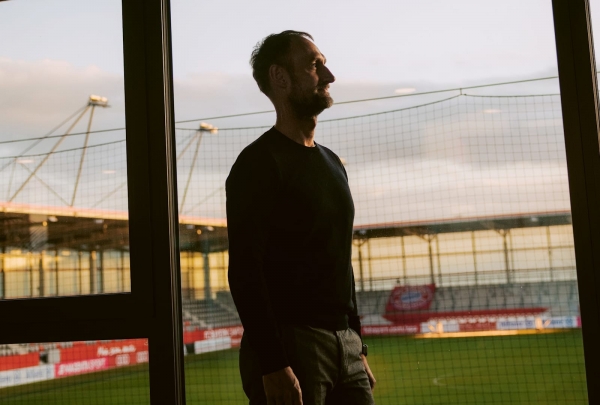
What distinguishes FC Bayern’s training philosophy?
Sauer: The principle of “Mia san mia” is an essential part of our philosophy. It’s about character, winning mentality and identification. Regionality therefore plays an important role for us. In the Munich and Bavaria area, we want to retain the best talent up to U14. From the age of 14 or 15, we also start looking around within Germany’s borders, because otherwise the catchment area around Munich would be too small to train players for the Champions League. From the age of 16, we also start looking at Europe. However, a balance in the youth teams is very important to us. If a player comes from Germany or abroad for the U17s, he has to be one of the best three players of that age group. This ensures that between 60 and 65 percent of the players in our U19 squad are Bavarian.
When you convince talented players that FC Bayern is the right place for them, you also try to support them individually. How important is the work with individual players?
Sauer: Individual training is an aspect that is currently coming much more into focus. From the mid-2000s to the mid-2010s, football training was very much characterized by tactics and the development of tactical concepts. I have the impression that this has recently changed again somewhat. The team still has to function as a team, but when it comes to winning titles, you need the individual class of players to make the difference. That’s why, as part of our training strategy, we try to develop players position-specifically based on their individual strengths. Particularly between the ages of 14 and 17, technical refinements and cognitive skills have to be the focus in order to get specialists in the individual positions. That’s hardly possible in team training because a coach can’t look after everyone individually in a one-and-a-half-hour session.
What role does the skills.lab Arena play in the club’s individual training?
Sauer: It is the only training tool in which we can train football-specific skills and is therefore one of the most important tools for individualization. In the entrance area of our campus, we have put up pictures and quotes from a few of our graduates, including Philipp Lahm. He once said, when asked about the secret to his success, that he repeated certain routines so many times until they were so perfect that he no longer had a problem getting them on the pitch under stress. That’s exactly the point. In the skills.lab Arena, a player can achieve in half an hour what might take three or four conventional training sessions on the pitch. The significance of the Arena in the development of football skills is therefore enormous. By the way, the training there is also fun, which is not the case with every individual training. That’s why there’s hardly a minute when the Arena isn’t being used by our players.
Through the many trainings and assessments, the skills.lab Arena also generates a lot of data from each player. What does the club do with it?
Sauer: On the one hand, this data helps us monitor performance. We can see immediately whether and how players have improved in certain areas and adjust their training accordingly. The more data we collect from our players, the more meaningful it becomes. It’s particularly interesting when we can compare the data of current talents with that of top players like Jamal Musiala, who was still playing in the U17s four years ago. Based on his performance in the skills.lab, we can assess how far a current 15- or 16-year-old is from the absolute top level in certain areas. The same applies to players we invite to tryout.
That means the skills.lab Arena also plays a role in scouting players?
Sauer: For many players who train with us on a trial basis, we try to get an even better impression of their technical and cognitive abilities by screening them in the skills.lab Arena. You can check things there in such a short time that you would never see by watching a player in a game for 90 minutes.
How do you manage to adapt the system to current developments in football?
Sauer: The skills.lab Arena is a technical training tool. That’s why it’s important for us to have our own department in the form of our Innovation Center, which works together with Anton Paar SportsTec as a partner to constantly develop this tool further. This also involves checking which data other clubs are working with and which topics are currently important in football. So we are constantly monitoring whether our approach is the right one. We are competing with top European clubs, some of which are also economically superior to us. That’s why we can’t make any mistakes in the selection and development of our players. If we work with the right data, it is easier to forecast and accompany the development of players. So it is precisely in the selection and proven further development that the added value of this technology lies.
In the end, this is also expected to bring economic benefits.
Sauer: Uli Hoeneß also emphasized this at the opening of the Campus. He said that we want to try to avoid the transfer madness to some extent. That is precisely our goal. Every euro we invest in the Campus and in talent should ultimately lead to the professional department being provided with very well-trained players. Hopefully, this will save us one or two transfers in the future.
Photos: FC Bayern/Fritz Beck bzw. AP SportsTec/Wünscher